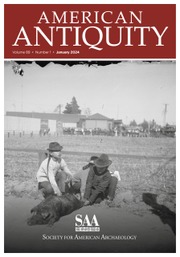Crossref Citations
This article has been cited by the following publications. This list is generated based on data provided by Crossref.
Schoenwetter, James
1979.
Comment on “Plant Husbandry in Prehistoric Eastern North America”.
American Antiquity,
Vol. 44,
Issue. 3,
p.
600.
Chomko, Stephen A.
and
Crawford, Gary W.
1979.
Reply to Schoenwetter.
American Antiquity,
Vol. 44,
Issue. 3,
p.
601.
Kay, Marvin
King, Francis B.
and
Robinson, Christine K.
1980.
Cucurbits from Phillips Spring: New Evidence and Interpretations.
American Antiquity,
Vol. 45,
Issue. 4,
p.
806.
Wilson, Hugh D.
1981.
DomesticatedChenopodium of the Ozark Bluff Dwellers.
Economic Botany,
Vol. 35,
Issue. 2,
p.
233.
FORD, RICHARD I.
1981.
Advances in Archaeological Method and Theory.
p.
281.
FORD, RICHARD I.
1981.
New Ideas about the Origin of Agriculture Based on 50 Years of Museum‐Curated Plant Remains.
Annals of the New York Academy of Sciences,
Vol. 376,
Issue. 1,
p.
345.
1982.
The Cannon Reservoir Human Ecology Project.
p.
395.
Schultze-Motel, Jürgen
1982.
Literatur über archäologische Kulturpflanzenreste (1980/1981).
Die Kulturpflanze,
Vol. 30,
Issue. 2,
p.
255.
MORSE, DAN F.
and
MORSE, PHYLLIS A.
1983.
Archaeology of the Central Mississippi Valley.
p.
137.
Reid, Kenneth C.
1984.
Fire and Ice: New Evidence for the Production and Preservation of Late Archaic Fiber-Tempered Pottery in the Middle-Latitude Lowlands.
American Antiquity,
Vol. 49,
Issue. 1,
p.
55.
Marquardt, William H.
1985.
Prehistoric Hunters-Gatherers.
p.
59.
Dent, Richard J.
1985.
Shawnee Minisink.
p.
123.
Bender, Barbara
1985.
Emergent Tribal Formations in the American Midcontinent.
American Antiquity,
Vol. 50,
Issue. 1,
p.
52.
Dent, Richard J.
and
Kauffman, Barbara E.
1985.
Shawnee Minisink.
p.
55.
Delcourt, Paul A.
Delcourt, Hazel R.
Cridlebaugh, Patricia A.
and
Chapman, Jefferson
1986.
Holocene Ethnobotanical and Paleoecological Record of Human Impact on Vegetation in the Little Tennessee River Valley, Tennessee.
Quaternary Research,
Vol. 25,
Issue. 3,
p.
330.
Haas, Herbert
1987.
Southern Methodist University Radiocarbon Date List III.
Radiocarbon,
Vol. 29,
Issue. 2,
p.
209.
WASELKOV, GREGORY A.
1987.
Advances in Archaeological Method and Theory.
p.
93.
Decker, Deena S.
1988.
Origin(s), evolution, and systematics ofCucurbita pepo (Cucurbitaceae).
Economic Botany,
Vol. 42,
Issue. 1,
p.
4.
Fritz, Gayle J.
1990.
Multiple pathways to farming in precontact eastern North America.
Journal of World Prehistory,
Vol. 4,
Issue. 4,
p.
387.
Heiser, Charles
1990.
New perspectives on the origin and evolution of new world domesticated plants: Summary.
Economic Botany,
Vol. 44,
Issue. S3,
p.
111.


